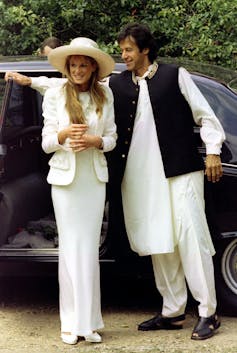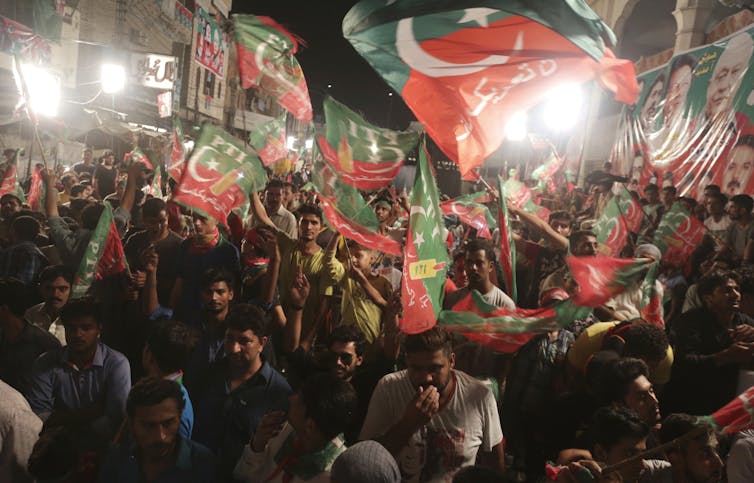Imran Khan hopes to transform Pakistan but he'll have far less power than past leaders
- Written by Adnan Rasool, Ph.D. Candidate/ Student Innovation Fellow, Georgia State University
Pakistan’s July 25 election, which brought the former cricket star Imran Khan into power as prime minister[1], was a landmark event.
It marked the second consecutive peaceful handover of power from one democratically elected government to another in a country where coups are commonplace.
Despite allegations that the Pakistani armed forces rigged the election[2] to benefit Khan[3], most opposition parties have now accepted[4] his win.
The 66-year-old, one-time world-famous athlete[5] founded his Pakistan Tehreek-e-Insaf political party in 1996 after his retirement from cricket. Khan will take power in mid-August after two decades as a parliamentarian and university chancellor[6] with the highest political ambitions.
Khan now confronts the daunting challenge of governing a fractious nuclear power of 220 million people with 39 percent poverty[7], chronic violence along its border with Afghanistan and a hulking national deficit.
And he must do so under severe budget constraints and new constitutional restrictions on the power of the prime minister’s office. In my analysis as a scholar of Pakistani democracy[8], Khan will take office as one of the weakest prime ministers in decades.
A return to federalism
Khan ran as a populist and promised to change life for Pakistanis, in particular his main constituency, Pakistan’s struggling urban middle class.
He pledged to come down hard on rampant government corruption[9], create 10 million jobs in five years[10] and bring back billions of dollars in remittances from migrants working overseas.
 Imran Khan with then-wife Jemima Goldsmith in 1995, shortly after entering politics.
Reuters/Kieran Doherty
Imran Khan with then-wife Jemima Goldsmith in 1995, shortly after entering politics.
Reuters/Kieran Doherty
The economy could certainly use the boost. Currently, the government is awaiting an International Monetary Fund loan of up to US$18 billion[11] – its twelfth bailout in 30 years. Pakistan has long struggled[12] with an unstable currency, insufficient tax collection and misuse of government funds.
Beyond ongoing financial constraints, Khan will likely struggle to advance his ambitious agenda due to a new system of power distribution in Pakistan that prioritizes local governments.
Like the United States or Canada, Pakistan has a federal government system. Its 1973 Constitution[13] gave Pakistan’s four provinces significant autonomy to run their own affairs, while the federal government manages national issues like foreign affairs, defense and international commerce.
But a series of military coups[14], dictatorships and martial law have centralized power at the federal level. For decades, Pakistan’s national leaders have exerted almost unchecked power over education, health care, agriculture and other important policy areas.
Seeking to enhance democracy in Pakistan by giving citizens more local control over the policies that affect their daily lives, Pakistan’s Parliament in 2010 amended the Constitution to devolve greater power to Pakistan’s four provinces. The 18th amendment[15] gave provincial governments control over climate change policy, social welfare, education, health care, agriculture and youth education and development.
Their new duties came with a bigger provincial budget allocation. Today, the federal government controls only 48 percent of Pakistan’s national budget[16].
Khan’s financial conundrum
That leaves Khan, the first prime minister elected since the 18th amendment went into effect in 2015, in a serious financial pinch.
Debt service to Pakistan’s international lenders already occupies roughly 30 percent of the federal budget[17]. Military and defense cost 20 percent[18]. And roughly 12 percent goes to running Pakistan’s 21 national ministries and other federal agencies, leaving little discretionary money[19] for social programs.
Now, Khan must fund his ambitious promises – better health care, education and jobs – with half as much money as his predecessors. Perhaps more importantly, he lacks the political jurisdiction to control policy in these issue areas.
As a result, the prime minister-elect will have to rely on Pakistan’s four provincial governments to help him implement his ambitious electoral agenda.
 Pakistanis rally behind Imran Khan before the country’s general election, on July 23, 2018.
AP Photo/K.M. Chaudary
Pakistanis rally behind Imran Khan before the country’s general election, on July 23, 2018.
AP Photo/K.M. Chaudary
Collaborating with the provinces
That will be easy in the province of Kyber Pakhtunkhwa, which is run by Khan’s Pakistan Tehreek-e-Insaf, or Pakistan Justice Movement.
There, his party is credited with improving law and order, health and education[20] over the past five years, and it held onto the provincial chief minister and governor posts in July’s election.
But two of Pakistan’s four provinces, Balochistan and Sindh, are controlled by opposition parties.
The Balochistan Awami Party was created in 2017[21] by military-backed defectors from the former ruling party of Pakistan[22], the Pakistan Muslim League.
Balochistan’s leadership has no loyalty to Khan. Since the Pakistani armed forces back both[23] Khan and the Balochistan Awami Party, however, their defense agendas may well line up. Balochistan shares a border with Afghanistan and Iran.
Khan has no common ground with the left-wing Pakistan People’s Party, which runs the second most populous province, Sindh. Founded by a prominent Pakistani politician, the late Zulfiqar Ali Bhutto, in 1967, the party currently faces multiple corruption investigations[24].
Supporters say the charges were engineered by Pakistani military intelligence to hurt the Pakistan People’s Party’s chances in July’s general election. Party leadership has so far refused to work with the prime minister-elect[25] to help him form a governing coalition.
The biggest challenge Khan faces in running Pakistan will likely be the province of Punjab. Its capital, Lahore, is an economic and cultural heavyweight in Pakistan, and Punjab is home to 55 percent of the country’s population.
Khan’s party did moderately well in Punjab this election, but did not win enough votes to form a provincial government. As a result, Khan’s Pakistan Justice Movement is now working to create a governing coalition[26] there.
The alliance his party is cobbling together consists of some two dozen political independents and defectors from other parties, many of whom have frequently changed political parties[27].
It remains to be seen whether these former competitors and frequent party-hoppers can work well enough together to run Pakistan’s most populous, powerful and prosperous province. Their loyalty to Khan and his agenda is also untested.
Pakistan’s fragile democracy
Despite these obstacles to governance, Khan campaigned as someone who believed he would have full executive power to change Pakistan’s future.
It is possible that the prime minister-elect does not yet understand how the 18th amendment has curtailed his role.
Once he does, federalism in Pakistan may be endangered.
One of the country’s most influential political analysts, Najam Sethi, believes that Khan will seek to repeal of the 18th amendment[28] when he realizes that he now shares a budget with four provincial governments.
That would be a step back for Pakistan as it seeks to create a government by and for the people after seven decades of fitful democracy.
References
- ^ Imran Khan into power as prime minister (www.vox.com)
- ^ rigged the election (www.vox.com)
- ^ Khan (www.npr.org)
- ^ opposition parties have now accepted (www.smh.com.au)
- ^ 66-year-old, one-time world-famous athlete (www.dw.com)
- ^ university chancellor (theconversation.com)
- ^ 39 percent poverty (www.pk.undp.org)
- ^ scholar of Pakistani democracy (www.adnanrasool.com)
- ^ rampant government corruption (www.theatlantic.com)
- ^ create 10 million jobs in five years (tribune.com.pk)
- ^ International Monetary Fund loan of up to US$18 billion (www.thenews.com.pk)
- ^ long struggled (www.reuters.com)
- ^ 1973 Constitution (www.pakistani.org)
- ^ military coups (theconversation.com)
- ^ 18th amendment (lgkp.gov.pk)
- ^ controls only 48 percent of Pakistan’s national budget (www.pide.org.pk)
- ^ 30 percent of the federal budget (www.finance.gov.pk)
- ^ 20 percent (www.finance.gov.pk)
- ^ little discretionary money (www.jstor.org)
- ^ improving law and order, health and education (www.economist.com)
- ^ created in 2017 (www.atimes.com)
- ^ military-backed defectors from the former ruling party of Pakistan (www.dawn.com)
- ^ back both (www.economist.com)
- ^ multiple corruption investigations (tribune.com.pk)
- ^ refused to work with the prime minister-elect (www.dawn.com)
- ^ working to create a governing coalition (www.independent.co.uk)
- ^ frequently changed political parties (tribune.com.pk)
- ^ repeal of the 18th amendment (www.thefridaytimes.com)
Authors: Adnan Rasool, Ph.D. Candidate/ Student Innovation Fellow, Georgia State University

